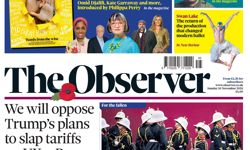Steve Auckland is an impatient Yorkshireman who obviously likes a challenge.
After being chief executive of Local World, which was profitable, Auckland returned to the Daily Mail and General Trust (DMGT) for a second stint running Metro, also a profitable business.
Then, last July, he joined the Evening Standard and Independent Media Group (ESI), which also owns London Live, the capital-wide television channel, and a group, where overall, lots of red ink has been the order of the day for years.
“DMGT asked me to do that job (Metro) for a year but when it was half way through, the guys here (ESI) came in for me and I thought that was a bigger challenge working on the portfolio that we have got here,” says Auckland.
The move appeared more courageous than merely challenging, but it wasn’t exactly a blind leap of faith for the experienced regional newspaper executive.
Under previous chief executive Andy Mullins, the London Evening Standard had already made its first early profits and the i had provided, as Mullins described it, a rubber ring around the Independent. As for London Live, the early outlook appeared grim with a viewing share in London of 0.16 per cent for its first quarter on air.
“You could see the Standard was into profit and doing reasonably well and on top of that, the losses on the Independent brands had declined dramatically which gives us a lot more faith,” says Auckland.
“Before signing on the dotted line, I knew what the numbers were so I knew it (the business) was challenged but I could also see there were opportunities, things that you could do pretty quickly and that I would have the backing to do them and that has proved to be the case so far,” he adds.
The full extent of that backing by his chairman and proprietor Evgeny Lebedev came out in a raft of financial announcements during the summer.
The most dramatic was that Evgeny and his father, Alexander Lebedev, have poured no less than £111 million in the form of loans into the UK media businesses so far and that figure included a £12 million interest free loan last year, apparently to cover the first six months of losses at London Live.
It hardly needs saying that without such long-term financial support, the ESI businesses would not exist.
The Evening Standard, in which the owners of the Daily Mail retain a 24.9 per cent stake, said it had now been in the black for three consecutive years and made a profit of £1.4 million in the year to September 2014.
The Independent
At the Independent and associated i, there had been a “dramatic improvement in its financial position”. There had been a trading loss of £4.6 million for the year but that compared with a £9.1 million loss in 2013 and a £22.6 million loss in 2010-11.
There was clearly a wobble early last year when the main Independent founder, Andreas Whittam Smith, was asked to try and find a buyer or additional investor. The attempt came to nothing but the mood has since lightened considerably.
“We had this expression earlier this year, that we were in danger of making a profit (at the Independent). Well we won’t make a profit this year but we are looking a lot, lot better,” says Auckland.
The Independent with a circulation of marginally under 60,000, Auckland believes, punches way above its weight in terms of impact and the high quality of its journalism – a reputation that is particularly marked in the US and the Middle East.
The paper’s daily online average unique browsers is now 2.5 million, a year-on-year rise of 37 per cent with 52.6 million monthly users, around 35 per cent of them in the UK.
Auckland believes there is considerable scope to develop the i, partly because the matrix design appeals to younger readers.
The paper largely weathered the impact of a price increase from 30p to 40p with sales, including bulks, of 277,202 showing a year-on-year drop of 5.5 per cent.
Auckland plans to use his regional experience to make a push in particular areas with the i rather than always concentrating entirely on a national news offering.
“We could ingrain ourselves in an area and then move on. There’s a lot we can do and I am looking forward to it,” he says.
The Standard
At the Standard, where 900,000 copies are sent out every day, Auckland is bringing his traditional eye for detail to distribution and has already visited distributors with the Standard editor Sarah Sands.
They plan to make it a six monthly event.
“Some of the equipment was a bit out-dated. We are automating with little PDAs so the guys tell you on the screen how many returns and where copies are being dropped off,” the executive explains.
It’s also about making sure the vendors and the merchandising is more visible and in the autumn, “a bit more theatre” will be introduced at the moment when people are actually handed a copy of the Standard.
A complete upgrading of the Standard’s website, which already attracts 10.2 million monthly users, a rise of 68 per cent, is already under way.
Profits are expected to be up by more than 60 per cent in the year to September 2015.
Auckland bridles a bit when it is suggested that running the free Evening Standard must really just be like a continuation of being in charge of the Metro.
“The Metro is aimed at the young morning commuter. The Standard is a far more serious newspaper altogether. It is a campaigning newspaper, London-centric with more business coverage and really solid in the arts and entertainment,” he says.
“We have been able to enhance the product but at the same time, we are capitalising on it from a commercial point of view,” Auckland adds.
London Live
The most problematical part if his portfolio is London Live, which many initially wrote off.
When at Local World, Auckland declined to invest in any of the new local television franchises, and he still believes they will find it challenging to establish themselves.
“I absolutely stayed away from investing, but one thing I did say, if it’s going to work anywhere, it is going to work in London,” insists Auckland who was initially pessimistic about the prospects for London Live.
“I am not the most patient of people and I do want to see a business that is growing and shows a proper profit. A while ago I found that very difficult to see at London Live,” he adds.
In fact in an interview in May, Auckland suggested that the company couldn’t keep propping up London Live and that once everything had been tried, if it was still losing money, it would have to close. Later, by way of clarification, the ESI chief executive emphasised that the possibility of closure had not been discussed.
Since then, under chief operating officer Tim Kirkman, there has been a pronounced upward trend in viewing figures and audience share leaving the days of the pitiful 0.16 performance far behind.
London Live has seen fifteen months of consistent growth to a 0.46 per cent share in July, which equates to an average weekly reach of 962,000 viewers - ahead of subscription channels such as Sky Atlantic and Discovery in London.
Early figures for August suggested the upward trend is continuing with a further 18 per cent growth over July.
The initial £12 million losses for the first six months on air will halve for the full year to September and then are due to halve again next year.
At the present run rate, Auckland believes London Live could break even at the trading level within two years.
The reason for the improvement is clear - an increased emphasis on showing popular acquired programmes such as an Ealing Studios film every afternoon.
But how local is London Live?
Auckland reply relies on the fact that it is based in London and reflects a London influence by showing Ealing films.
“I think what we have found is that the local news teams have done as good a job certainly as anybody else in the sector by a long way. The problem is that it is not actually driving the audience and that is an issue for us,” Auckland admits.
That is why London Live has “diversified in the way it has” the ESI chief executive explains.
“We will continue to do our London programming but will it be as prominent? No it probably won’t and that’s how it is,” says Auckland with an air of finality.
Rivals who lost out to London Live in the franchise battle, and media regulator Ofcom, will certainly be watching how that balance between acquired entertainment and locally produced programming evolves in future.
What is it like working for Evgeny Lebedev, at 35, the UK’s youngest newspaper proprietor?
Lebedev, who has other business, artistic and charitable interests, is not usually involved on a day-to-day basis.
“You are aware what he wants to do and how he wants the business to be run but you are allowed enough space to be able to do what you need to do,” says Auckland. His main link is with Justin Byam Shaw, the entrepreneur who is deputy chairman of Independent Print, which owns the Independent.
Overall, Steve Auckland says of his proprietors and the media brands they have funded: “Look what the Lebedevs have done. They bought the Standard when it was losing a fortune and pulled that round and into profit. The Independent is a similar situation and London Live as well, so they do like to prove people wrong.”












